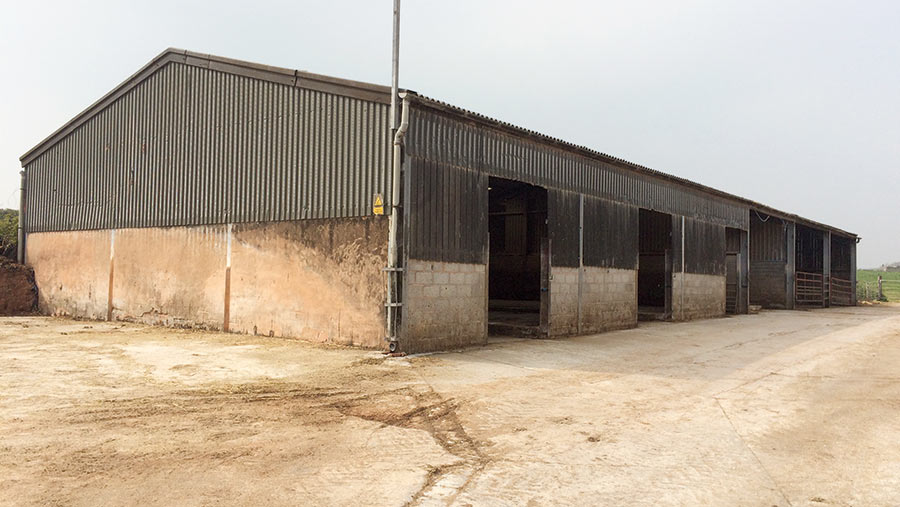Business Clinic: Can I convert dairy building to residential use?

Whether it’s a legal, tax, insurance, management or land issue, Farmers Weekly’s experts can help.
Here, Nicola Palfrey of Carter Jonas advises on the prospects for making use of permitted development rights which allow certain farm buildings to be converted to residential use.
Q. I am planning to retire from dairy farming as I have no successors.
I would like to achieve the best value for my farm and therefore I wonder if my 90’x45’ (27.4m x 13.7m) cubicle shed which the cows are currently occupying will comply with the Class Q rights to convert farm buildings to residential use.
It is steel portal framed with part concrete block and part timber clad walls beneath a fibre cement roof and concrete floor, with some large openings for getting the tractors in to scrape out.
A. Having made the decision to retire, the next step is planning for the future to ensure your property is in the best position for a profitable sale.
The government extended the perimeters of the Class Q rights last year and the rules are increasingly being used by landowners to convert barns to residential use.
Your building totals approximately 4,050 sq ft (376 sq m), which falls within the size parameters under the rights. It has the potential for conversion into one residential building, at 376 sq m, or four dwellings, none exceeding 100 sq m.
See also: Business Clinic – advice on rhi and planning permission
Before proceeding, check that Article 2 designations concerning protected land do not apply to your farm. If any of the curtilage falls within a protected area this will make the building ineligible for Class Q.
There is a long list of such designations, including Areas of Outstanding Natural Beauty, Sites of Special Scientific Interest and World Heritage Sites.
Additionally, your agricultural permitted development rights must have not been used since 20 March 2013.
There must be suitable and safe access to the building from the highway and the building must not be in a flood risk zone or have any previous contamination issues.
If the farming operation is to cease, issues concerning noise impacts and general environmental health may not be a problem, but any close buildings are likely to require a non-livestock use to ensure they do not cause a nuisance to the dwelling occupiers.
From your description, your barn sounds fairly modern.
Following the High Court judgement of Hibbitt & Anr v Secretary of State for Communities and Local Government & Anr, some modern structures have fallen foul of the rules, with applications being refused because the proposal involves extensive rebuilding and goes beyond what could reasonably be described as conversion.
However, our team has recently obtained approval on a modern agricultural barn in Sedgemoor District Council, which has many similarities to your building.
In the Sedgemoor case, the barn – also a former cubicle shed – was steel portal framed with a concrete floor, part concrete block walls with timber cladding above and a pitched corrugated roof.
The proposal retained all structural aspects of the frame, roof and part concrete block walls, but would replace the timber cladding and install windows and doors.
The timber cladding was allowed to be removed and replaced because it did not form part of the structure of the barn and instead provided weather screen cladding.
The proposal also included demolition of a bay to reduce the size of the overall barn to ensure it complied with the size restrictions of the legislation. The application was supported by a structural appraisal report to prove the building was capable of conversion.
As always, the devil is in the detail, but on the face of it, it looks like there’s the potential for a successful application.
For the next step I would arrange for a planning consultant to view the building to ensure it meets the necessary criteria and to assist in preparing an application for Class Q.
It may sound obvious, but a well-prepared application that specifically addresses all aspects of the legislation has a much higher chance of being given the green light.
Do you have a question for the panel?
Outline your legal, tax, finance, insurance or farm management question in no more than 350 words and Farmers Weekly will put it to a member of the panel. Please give as much information as possible.
Send your enquiry to Business Clinic, Farmers Weekly, RBI, Quadrant House, The Quadrant, Sutton, Surrey SM2 5AS.
You can also email your question to fwbusinessclinic@rbi.co.uk.

